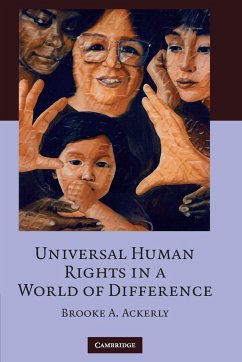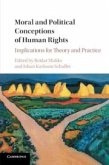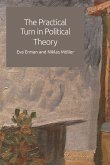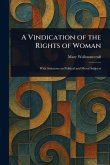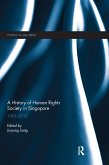Brooke A Ackerly
Universal Human Rights in a World of Difference
Brooke A Ackerly
Universal Human Rights in a World of Difference
- Broschiertes Buch
- Merkliste
- Auf die Merkliste
- Bewerten Bewerten
- Teilen
- Produkt teilen
- Produkterinnerung
- Produkterinnerung
A feminist argument in favour of human rights as wide-ranging and universal.
Andere Kunden interessierten sich auch für
![Moral and Political Conceptions of Human Rights Moral and Political Conceptions of Human Rights]() Moral and Political Conceptions of Human Rights39,99 €
Moral and Political Conceptions of Human Rights39,99 €![The Human Rights Graphic Novel The Human Rights Graphic Novel]() Pramod K NayarThe Human Rights Graphic Novel62,99 €
Pramod K NayarThe Human Rights Graphic Novel62,99 €![The Practical Turn in Political Theory The Practical Turn in Political Theory]() Eva ErmanThe Practical Turn in Political Theory34,99 €
Eva ErmanThe Practical Turn in Political Theory34,99 €![A Vindication of the Rights of Woman A Vindication of the Rights of Woman]() Mary WollstonecraftA Vindication of the Rights of Woman18,99 €
Mary WollstonecraftA Vindication of the Rights of Woman18,99 €![The Social Contract: Or, The Principles Of Political Rights The Social Contract: Or, The Principles Of Political Rights]() Jean-Jacques RousseauThe Social Contract: Or, The Principles Of Political Rights21,99 €
Jean-Jacques RousseauThe Social Contract: Or, The Principles Of Political Rights21,99 €![Achieving Human Rights Achieving Human Rights]() Richard FalkAchieving Human Rights52,99 €
Richard FalkAchieving Human Rights52,99 €![A History of Human Rights Society in Singapore A History of Human Rights Society in Singapore]() A History of Human Rights Society in Singapore58,99 €
A History of Human Rights Society in Singapore58,99 €-
-
-
Produktdetails
- Produktdetails
- Verlag: Cambridge University Press
- Seitenzahl: 388
- Erscheinungstermin: 26. Juni 2008
- Englisch
- Abmessung: 229mm x 152mm x 21mm
- Gewicht: 561g
- ISBN-13: 9780521707558
- ISBN-10: 0521707552
- Artikelnr.: 23352272
- Herstellerkennzeichnung
- Libri GmbH
- Europaallee 1
- 36244 Bad Hersfeld
- gpsr@libri.de
- Verlag: Cambridge University Press
- Seitenzahl: 388
- Erscheinungstermin: 26. Juni 2008
- Englisch
- Abmessung: 229mm x 152mm x 21mm
- Gewicht: 561g
- ISBN-13: 9780521707558
- ISBN-10: 0521707552
- Artikelnr.: 23352272
- Herstellerkennzeichnung
- Libri GmbH
- Europaallee 1
- 36244 Bad Hersfeld
- gpsr@libri.de
Brooke A. Ackerly is Associate Professor of Political Science at Vanderbilt University. She is the author of Political Theory and Feminist Social Criticism (Cambridge, 2000) and co-editor of Feminist Methodologies for International Relations (Cambridge, 2006).
1. Universal human rights in a world of difference: challenging our
thinking; Part I. Epistemology, Diversity, and Disagreement in Theory and
Practice: 2. Universal human rights?; 3. Universalisms and differences; 4.
Immanent and universal human rights: more legitimate than reasonable; Part
II. A Methodology for Immanent Theory: 5. Feminist curb cutting: a
methodology for exposing silences and revealing differences: immanent study
of universal human rights; 6. Listening to the silent voices, hearing
dissonance: a methodology for interpretation and analysis; Part III.
Immanent Universal Human Rights: Theory and Practice: 7. An immanent and
universal theory of human rights: curb cutting in theory; 8. Terrain(s) of
difficulty: obligation, problem-solving and trust; 9. Feminist strategies;
10. 'If I can make a circle'.
thinking; Part I. Epistemology, Diversity, and Disagreement in Theory and
Practice: 2. Universal human rights?; 3. Universalisms and differences; 4.
Immanent and universal human rights: more legitimate than reasonable; Part
II. A Methodology for Immanent Theory: 5. Feminist curb cutting: a
methodology for exposing silences and revealing differences: immanent study
of universal human rights; 6. Listening to the silent voices, hearing
dissonance: a methodology for interpretation and analysis; Part III.
Immanent Universal Human Rights: Theory and Practice: 7. An immanent and
universal theory of human rights: curb cutting in theory; 8. Terrain(s) of
difficulty: obligation, problem-solving and trust; 9. Feminist strategies;
10. 'If I can make a circle'.
1. Universal human rights in a world of difference: challenging our
thinking; Part I. Epistemology, Diversity, and Disagreement in Theory and
Practice: 2. Universal human rights?; 3. Universalisms and differences; 4.
Immanent and universal human rights: more legitimate than reasonable; Part
II. A Methodology for Immanent Theory: 5. Feminist curb cutting: a
methodology for exposing silences and revealing differences: immanent study
of universal human rights; 6. Listening to the silent voices, hearing
dissonance: a methodology for interpretation and analysis; Part III.
Immanent Universal Human Rights: Theory and Practice: 7. An immanent and
universal theory of human rights: curb cutting in theory; 8. Terrain(s) of
difficulty: obligation, problem-solving and trust; 9. Feminist strategies;
10. 'If I can make a circle'.
thinking; Part I. Epistemology, Diversity, and Disagreement in Theory and
Practice: 2. Universal human rights?; 3. Universalisms and differences; 4.
Immanent and universal human rights: more legitimate than reasonable; Part
II. A Methodology for Immanent Theory: 5. Feminist curb cutting: a
methodology for exposing silences and revealing differences: immanent study
of universal human rights; 6. Listening to the silent voices, hearing
dissonance: a methodology for interpretation and analysis; Part III.
Immanent Universal Human Rights: Theory and Practice: 7. An immanent and
universal theory of human rights: curb cutting in theory; 8. Terrain(s) of
difficulty: obligation, problem-solving and trust; 9. Feminist strategies;
10. 'If I can make a circle'.

